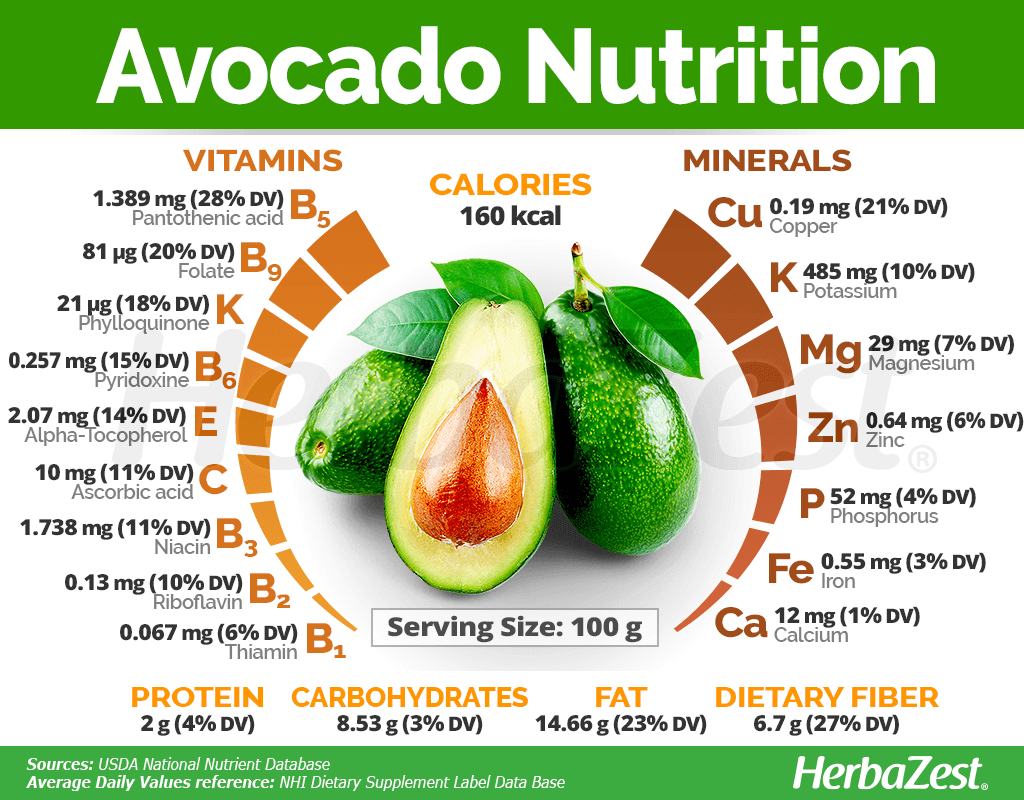Your trusted source for simple, practical nutrition advice and tips for a healthier lifestyle.
Avocados are rich in healthy fats, vitamins, and minerals. They contain potassium, fiber, and antioxidants.
Avocados are a nutritional powerhouse, offering numerous health benefits. These creamy fruits are packed with essential nutrients like healthy monounsaturated fats, which support heart health. They provide a good amount of potassium, which helps regulate blood pressure. Avocados are also high in fiber, aiding in digestion and promoting a feeling of fullness.
The presence of antioxidants such as vitamin E and vitamin C boosts the immune system and protects against oxidative stress. With their versatile use in various dishes, avocados make it easy to incorporate these nutrients into your diet, enhancing overall well-being. This unique combination of nutrients makes avocados a valuable addition to any healthy eating plan.

Credit: www.energymealplans.com
Introduction To Avocados
Avocados are a unique fruit, known for their creamy texture and rich taste. They are packed with essential nutrients that benefit overall health. This section will introduce you to avocados, their history, and their popularity in modern diets.
Brief History
The avocado originated in South Central Mexico. It has been cultivated for thousands of years. Ancient civilizations like the Aztecs and Mayans valued avocados. They called it “ahuacatl,” which means testicle, due to its shape. Spanish explorers brought avocados to Europe in the 16th century. By the 19th century, avocados spread to the United States and other parts of the world.
Popularity In Modern Diets
Today, avocados are a global favorite. They are featured in various cuisines and recipes. Their creamy texture makes them ideal for spreads and dips. Guacamole is a popular dish made from mashed avocados. Avocados are also used in salads, smoothies, and even desserts. Their popularity has soared due to their health benefits.
| Nutrient | Benefit |
|---|---|
| Fiber | Promotes digestive health |
| Potassium | Supports heart health |
| Vitamin E | Acts as an antioxidant |
Avocados are rich in essential nutrients. They provide vitamins, minerals, and healthy fats. These nutrients support heart health, digestion, and skin health. Avocados are also low in sugar. This makes them a great choice for balanced diets.
- High in healthy fats
- Rich in fiber
- Contains more potassium than bananas
- Loaded with antioxidants
- Supports eye health
Nutritional Profile
Avocados are packed with nutrients that benefit your health. Their rich nutritional profile makes them an excellent addition to your diet.
Vitamins And Minerals
Avocados are rich in essential vitamins and minerals. Below is a table showcasing some of the key nutrients:
| Vitamin/Mineral | Amount per 100g | Daily Value (%) |
|---|---|---|
| Vitamin K | 21 mcg | 26% |
| Folate | 81 mcg | 20% |
| Vitamin C | 10 mg | 12% |
| Potassium | 485 mg | 14% |
These vitamins and minerals support various bodily functions. They help in blood clotting, cell repair, and boosting immunity. Avocados also improve heart health due to their high potassium content.
Healthy Fats
Avocados are known for their healthy fats. They contain monounsaturated fats, which are good for your heart. These fats help reduce bad cholesterol levels. Below are the types of fats in avocados:
- Monounsaturated Fat: 10g
- Polyunsaturated Fat: 2g
- Saturated Fat: 2g
Monounsaturated fats are the healthiest among them. They help in maintaining good cholesterol levels. This reduces the risk of heart diseases. Avocados also provide a source of omega-3 fatty acids, which improve brain function.
Heart Health
Avocados are packed with nutrients that support heart health. They contain healthy fats, vitamins, and minerals that can improve cardiovascular function. Let’s explore how they help with cholesterol and blood pressure.
Cholesterol Management
Avocados contain monounsaturated fats which are good for your heart. These fats help lower bad cholesterol (LDL). They also increase good cholesterol (HDL). This balance is crucial for heart health.
Avocados also have beta-sitosterol, a plant chemical. Beta-sitosterol helps reduce cholesterol levels. Eating avocados regularly can keep your cholesterol in check.
Blood Pressure Control
Avocados are rich in potassium. Potassium helps control blood pressure. It balances sodium levels in your body.
Here’s a simple table to show the potassium content in avocados:
| Food Item | Potassium (mg) |
|---|---|
| Half an Avocado | 487 |
High potassium levels help relax blood vessels. This reduces the risk of high blood pressure. Eating avocados can thus help maintain a healthy blood pressure.
Avocados are also rich in magnesium. Magnesium further aids in blood pressure control. It helps in the relaxation of blood vessels.
Weight Management
Avocados are an excellent addition to a weight management plan. They offer nutrients that help control appetite and manage caloric intake. Let’s explore two key aspects of avocados that contribute to weight management: satiety and appetite control, and caloric density.
Satiety And Appetite Control
Avocados are rich in healthy fats and fiber. These nutrients help you feel full for longer periods. This reduces the urge to snack between meals. The fiber in avocados slows down digestion. This leads to better appetite control.
Here is a breakdown of key nutrients in avocados:
| Nutrient | Amount per 100g |
|---|---|
| Fiber | 7g |
| Healthy Fats | 15g |
Consuming avocados may help reduce overall calorie intake. This is due to their ability to keep you satisfied.
Caloric Density
Avocados have a moderate caloric density. This means they provide a lot of nutrients without too many calories. A single avocado has about 160 calories.
Despite their caloric content, avocados are nutrient-dense. They offer essential vitamins and minerals. Here is a list of some:
- Vitamin K
- Folate
- Vitamin C
- Potassium
Including avocados in your diet can help you stay within your caloric limits. This supports weight management goals effectively.
Digestive Health
Avocados are not only delicious but also packed with nutrients. These nutrients greatly benefit digestive health. Let’s explore how avocados can improve your digestion.
Fiber Content
Avocados are rich in fiber. Fiber is essential for healthy digestion. One medium avocado contains about 10 grams of fiber.
Fiber helps move food smoothly through your digestive tract. This can prevent constipation and promote regular bowel movements.
Here’s a simple breakdown of the types of fiber in avocados:
| Type of Fiber | Amount |
|---|---|
| Soluble Fiber | 2.1 grams |
| Insoluble Fiber | 7.9 grams |
Soluble fiber dissolves in water. It forms a gel-like substance in your stomach. Insoluble fiber adds bulk to stool. Both types of fiber are beneficial for digestive health.
Gut Microbiome
The gut microbiome is a collection of bacteria in your digestive tract. These bacteria play a crucial role in digestion. Avocados can positively influence your gut microbiome.
Avocados contain prebiotics. Prebiotics are a type of fiber that feeds good bacteria in your gut. By eating avocados, you can promote the growth of beneficial bacteria.
- Improves nutrient absorption.
- Boosts immune system.
- Reduces inflammation.
Maintaining a healthy gut microbiome can lead to better overall health. Adding avocados to your diet is a tasty way to support your digestive system.

Credit: www.herbazest.com
Skin And Hair Benefits
Avocados are packed with nutrients that benefit both skin and hair. Rich in vitamins, minerals, and natural oils, they nourish and rejuvenate, making them a popular choice in beauty routines.
Vitamin E
Vitamin E is a powerful antioxidant found in avocados. It helps in protecting the skin from damage caused by UV rays. This vitamin also assists in reducing inflammation and promoting skin healing.
Vitamin E supports cell regeneration, which keeps the skin looking youthful. It also helps to prevent dryness and maintain skin elasticity.
| Benefit | Description |
|---|---|
| Protection | Shields skin from UV damage. |
| Healing | Reduces inflammation and aids in recovery. |
| Moisturizing | Prevents dryness and maintains elasticity. |
Natural Oils
Avocados are rich in natural oils that deeply moisturize the skin. These oils penetrate the skin layers, providing long-lasting hydration.
For hair, these oils help in preventing dryness and reducing frizz. They also promote a healthy scalp, which is essential for strong, shiny hair.
- Deeply moisturizes skin
- Prevents hair dryness
- Reduces frizz
- Promotes a healthy scalp
Incorporating avocados into your diet or beauty routine can lead to significant improvements in skin and hair health. Their natural oils and vitamins work wonders in keeping you looking your best.
Anti-inflammatory Properties
Avocados are not only delicious but also packed with nutrients that can reduce inflammation. These fruits contain compounds that help soothe the body. Let’s dive into some of these beneficial nutrients.
Antioxidants
Avocados are rich in antioxidants. These compounds fight free radicals in your body.
- Vitamin E: This vitamin helps reduce inflammation and boost immunity.
- Vitamin C: It helps protect your cells from damage.
- Carotenoids: These pigments reduce inflammation and promote eye health.
Consuming avocados provides your body with these powerful antioxidants.
Oleic Acid
Another key nutrient in avocados is oleic acid. This is a type of monounsaturated fatty acid.
Oleic acid has several benefits:
- It reduces inflammation.
- It helps lower bad cholesterol levels.
- It promotes heart health.
Eating avocados can help you get more of this healthy fat. This can make a big difference in your overall health.
| Nutrient | Benefit |
|---|---|
| Vitamin E | Reduces inflammation and boosts immunity |
| Vitamin C | Protects cells from damage |
| Carotenoids | Promotes eye health |
| Oleic Acid | Lowers bad cholesterol and promotes heart health |
Including avocados in your diet can help your body fight inflammation effectively.
Incorporating Avocados Into Your Diet
Avocados are a nutrient-dense fruit packed with vitamins and minerals. They are versatile and can be added to various meals. Incorporating avocados into your diet can improve your health and add delicious flavors to your dishes.
Recipe Ideas
Adding avocados to your meals is easy and tasty. Here are some simple and delicious recipe ideas:
- Avocado Toast: Mash an avocado and spread it on whole-grain toast. Sprinkle with salt, pepper, and a squeeze of lemon.
- Guacamole: Mix mashed avocados with diced tomatoes, onions, cilantro, and lime juice. Serve with tortilla chips or veggies.
- Avocado Smoothie: Blend avocado with spinach, banana, and almond milk for a creamy smoothie.
- Avocado Salad: Combine avocado slices with mixed greens, cherry tomatoes, and a light vinaigrette.
- Stuffed Avocados: Fill avocado halves with tuna salad or chickpea salad for a quick meal.
Daily Recommendations
Eating avocados daily can boost your nutrient intake. They are rich in healthy fats, fiber, and vitamins. Here are the recommended daily servings:
| Age Group | Recommended Servings |
|---|---|
| Children (4-8 years) | 1/4 to 1/2 avocado |
| Teens (9-18 years) | 1/2 to 1 avocado |
| Adults (19+ years) | 1 avocado |
Including avocados in your diet provides numerous health benefits. They support heart health, improve digestion, and enhance nutrient absorption.
:max_bytes(150000):strip_icc()/avocado_annotated-29ebeb829c02433aaa55de1ab7d28643.jpg)
Credit: www.verywellfit.com
Frequently Asked Questions
What Nutrients Are In Avocados?
Avocados are rich in healthy fats, fiber, vitamins, and minerals. They contain vitamins K, C, E, and B-6. They also provide folate, magnesium, and potassium.
Are Avocados High In Potassium?
Yes, avocados are high in potassium. One avocado has more potassium than a banana. Potassium helps maintain healthy blood pressure.
Do Avocados Contain Healthy Fats?
Yes, avocados contain healthy fats. They are rich in monounsaturated fats, which are heart-healthy. These fats can reduce bad cholesterol levels.
How Much Fiber Is In An Avocado?
One avocado contains about 10 grams of fiber. This includes both soluble and insoluble fiber. Fiber aids in digestion and supports gut health.
Conclusion
Avocados are a nutrient powerhouse, packed with vitamins, minerals, and healthy fats. They support heart health and aid digestion. Including avocados in your diet can boost your overall well-being. Enjoy this versatile fruit in salads, smoothies, or on toast. Embrace the benefits of avocados and enhance your nutrition effortlessly.





